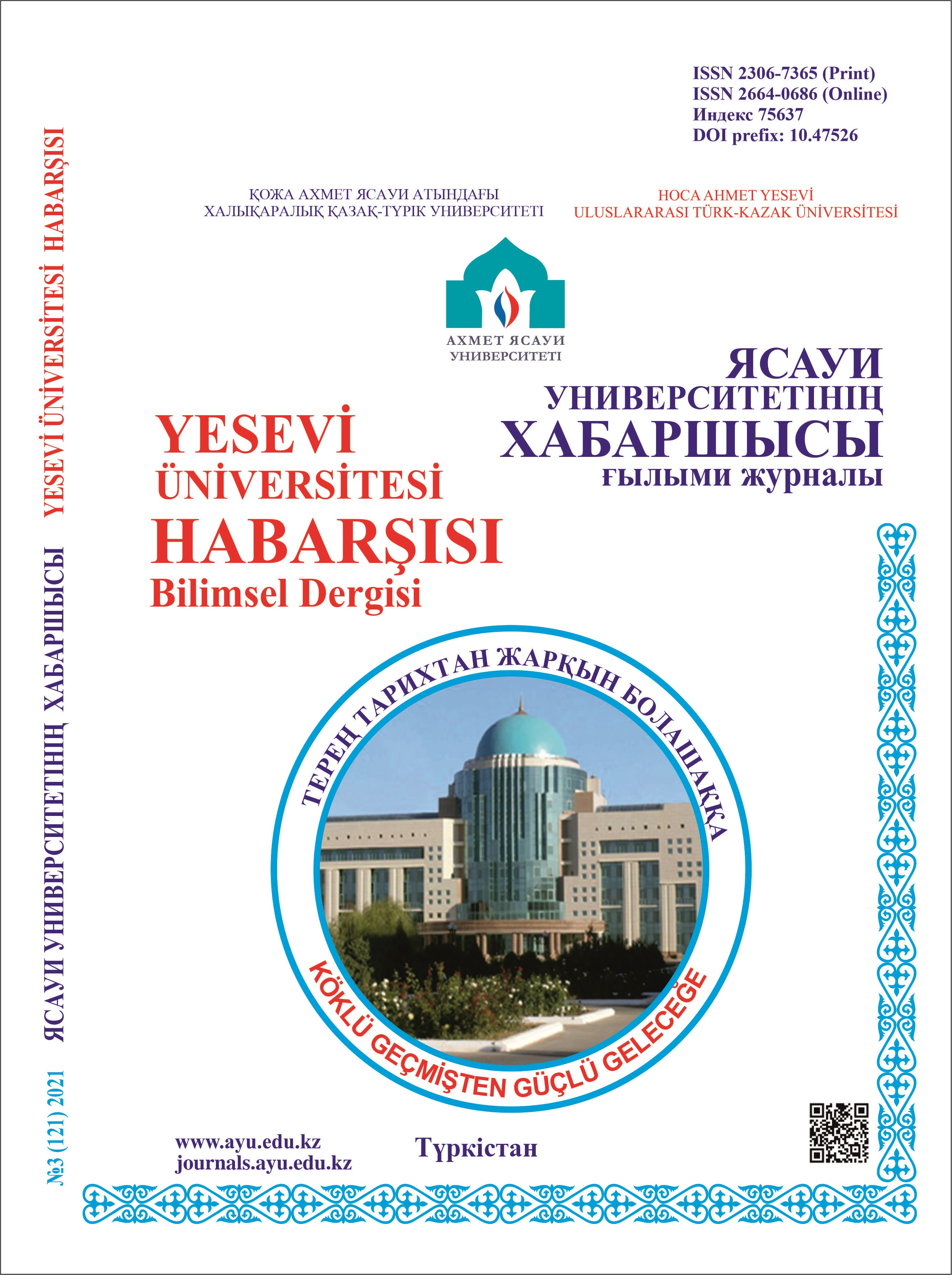Changes in the Semantic Development of Synonymous Terms
Anahtar Kelimeler:
synonym, synonym term, semantics, semantic analysis, pragmatic analysis, synonymous series, vocabulary-semantics, context.Özet
Although the problem of synonymy is one of the main categories of structural
linguistics, it does not hide the fact that it has many controversial issues. Basically, in order to fully
study all the functions and natural phenomena of synonymy, it is necessary to conduct a study of
semantics in the form. Although the phenomenon of synonymy is recognized in a separate section
of lexicology, its universal character allowed to consider it in all areas of linguistic structure.
Regardless of the language in which we speak, we follow for that there is a category of synonyms.
The phenomenon of synonymy differs in its function of distinguishing values. And meaning is
a linguistic expression of thoughts and cognition, therefore, in linguistic questions, related to
meaning, does not fit into fixed formulas within the framework of structural linguistics. In terms of
the expansion of human knowledge, dynamic changes in the meaning of the language also lead to
its transformation. Therefore, one of the unresolved issues in the phenomenon of synonymy is the
term synonyms. The article describes the reasons for the formation of term-synonyms, differences
from lexical synonyms and changes in semantic development. The study of terms-synonyms is
carried out with the aim of developing the use of national terms. This is due to the fact that even
now in the Kazakh language there is an equivalent for foreign terms, the parallel use of the term
prevents the unification of the term. The formation of absolute synonymous pairs of terms denoting one and the same concept means that one scientific concept has two titles. Therefore, it is necessary to prove which of the two names was chosen and confirmed as a term. This article also serves this purpose.
Referanslar
Қадырқұлов Қ. Синоним сөздер және олардың лексика-семантикалық тұрғыдан үйлесімділігі //
Ұлағат журналы. – 2010. – 4 тамыз. – Б. 74–79.
Сағындықұлы Б. Қазіргі қазақ тілі. Лексикология. І бөлім: Оқу құралы. – Алматы: Қазақ
университеті, 2008. – 101 б.
Серғалиев М. Тіл білімінің өзекті мәселелері. – Астана: Фолиант, 2016. – 293 б.
Шаяхметова М.Х. Синонимдердің лексика-грамматикалық түрлері // ПМУ Хабаршысы.
Филология сериясы. – 2014. – №1. – Б. 34–38.
Аханов К. Қазақ тілі лексикасының өзекті мәселелері. – Алматы: Өлке, 2005. – 302 б.
Болғанбаев Ә. Сөз әлемі. – Алматы: Дарын, 2018. – 536 б.
Айғабылов А. Қазақ тілінің лексикологиясы. – Алматы: Зият Пресс, 2007. – 104 б.
Балақаев М. Қазақ тіл білімінің мәселелері. – Алматы: Арыс, 2008. – 592 б.
Бегалиева Л.Б. Синонимдік қолданыстың метафора жасаудағы маңызы // Әл-Фараби атындағы
ҚазҰУ Хабаршысы. Филология сериясы. – 2008. – №5 (113). – Б. 78–82.
Суючбакиева Н.К. Синонимия в когнитивной проекции // Абай атындағы ҚазҰПУ Хабаршысы.
Филология сериясы. – 2012. – №4 (42). – С. 96–104.
Бекбосынова А.Х. Синонимдік және антонимдік теңеулердің стильдік сипаты // ҚР Ұлттық
ғылым академиясының Хабаршысы. Филология сериясы. – 2009. – №6. – Б. 41–45.
Ахманова О.С. Словарь лингвистических терминов. – М.: Едиториал УРСС, 2004. – 576 с. 13. Лейчик В.М. Терминоведение: Предмет, методы, структура. – М.: КомКнига, 2006. – 256 с.
Petcharat N. A Corpus-Based Study of English Synonyms: Appropriate, Proper, and Suitable // LEARN
Journal: Language Education and Acquisition Research Network Journal. – 2017. – Volume 10, Issue
– P. 10–24.
Ajmal M., Kumar T., Ritonga M., Nukapangu V. A Corpus-Based Analysis of the Adjectives and
Synonyms-Beautiful, Handsome, and Pretty // World Journal of English Language. – 2022. – Vol. 12,
No. 2. Special Issue. – P. 159–168.
Qadyrqulov Q. Sinonim sozder jane olardyn leksika-semantikalyq turgydan uilesіmdіlіgі [Synonymous
words and their compatibility from a lexico-semantic point of view] // Ulagat jurnaly. – 2010. – 4 tamyz.
– P. 74–79. [in Kazakh]
Sagyndyquly B. Qazіrgі qazaq tіlі. Leksikologia. І bolіm: Oqu quraly [Modern Kazakh language.
Lexicology. Part I: Training Manual]. – Almaty, Qazaq universitetі, 2008. – 101 b. [in Kazakh]
Sergaliev M. Tіl bіlіmіnіn ozektі maselelerі [Actual problems of linguistics]. – Astana, Foliant, 2016.
b. [in Kazakh]
Shaiahmetova M.H., Akanova A.I. Sinonimderdіn leksika-grammatikalyq turlerі [Lexical and
grammatical types of synonyms] // PMU Habarshysy. Filologia seriasy. – 2014. – №1. – B. 34–38. [in
Kazakh]
Ahanov K. Qazaq tіlі leksikasynyn ozektі maselelerі [Actual problems of the Kazakh language
vocabulary]. – Almaty: Olke, 2005. – 302 b. [in Kazakh]
Bolganbaev A. Soz alemі [Word world]. – Almaty: Daryn, 2018. – 536 b. [in Kazakh]
Aigabylov A. Qazaq tіlіnіn leksikologiasy [Lexicology of the Kazakh language]. – Almaty: Ziat Press,
– 104 b. [in Kazakh]
Balaqaev M. Qazaq tіl bіlіmіnіn maselelerі [Problems of Kazakh linguistics]. – Almaty: Arys, 2008. –
b. [in Kazakh]
Begalieva L.B. Sinonimdіk qoldanystyn metafora jasaudagy manyzy [The importance of synonymous
use in making metaphors] // Al-Farabi atyndagy QazUU Habarshysy. Filologia seriasy. – 2008. –
№5(113). – B. 78–82. [in Kazakh]
Suiuchbakieva N.K. Sinonimia v kognitivnoi proekcii [Synonyms in cognitive projection] // Abaj
atyndaғy ҚazҰPU Habarshysy. Filologija serijasy. – 2012. – №4 (42). – S. 96–104. [in Russian]
Bekbosynova A.H. Sinonimdіk jane antonimdіk teneulerdіn stildіk sipaty [Stylistic character of
synonymous and antonym parables] // QR Ulttyq gylym akademiasynyn Habarshysy. Filologia seriasy.
– 2009. – №6. – B. 41–45. [in Kazakh]
Ahmanova O.S. Slovar lingvisticheskih terminov [Dictionary of Linguistic Terms]. – M.: Editorial
URSS, 2004. – 576 s. [in Russian]
Leichik V.M. Terminovedenie: Predmet, metody, struktura [Terminology: Subject, methods, structure].
– M.: KomKniga, 2006. – 256 s. [in Russian]
Petcharat N. A Corpus-Based Study of English Synonyms: Appropriate, Proper, and Suitable // LEARN
Journal: Language Education and Acquisition Research Network Journal. – 2017. – Volume 10, Issue 2.
– P. 10–24.
Ajmal M., Kumar T., Ritonga M., Nukapangu V. A Corpus-Based Analysis of the Adjectives and
Synonyms-Beautiful, Handsome, and Pretty // World Journal of English Language. – 2022. – Vol. 12,
No. 2. Special Issue. – P. 159–168.

